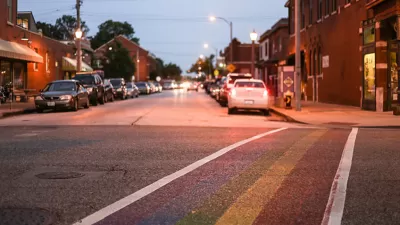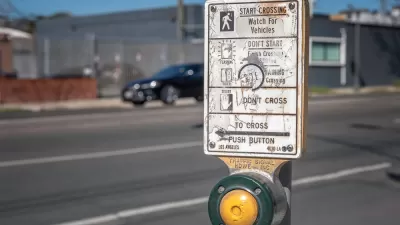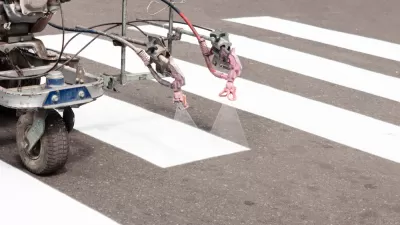There has been no shortage of responses to the story about St. Louis letting decorated sidewalks fade away after encountering federal policy that recommends more subdued colors.

Following news reported last weekend by the St. Louis Post-Dispatch that the city would let examples of decorated crosswalks fade away after determining they ran afoul of Federal Highway Administration policies, advocates and planners from around the country have spoken out.
First, Angie Schmitt responded with a pointed response to St. Louis, arguing that perhaps St. Louis Bike and Pedestrian Coordinator Jamie Wilson was being too stringent with his interpretation of the federal policy. Schmitt calls on an expert to show another way of responding to the policy:
Conor Semler, a planning consultant with the Boston-based firm Kittelson & Associates, said most cities he works with have interpreted the FHWA memo much differently. Cities like Baltimore — famous for its eye-catching zipper crosswalk — and Seattle have basically determined 'as long as the white transverse lines are clear, you can do almost anything inside that,' he said.
Speaking of Seattle, the Capitol Hill Times mobilized its staff in the wake of the story to follow up with Seattle Department of Transportation City Traffic Engineer Dongho Chang about the safety outcomes of the 11 rainbow crosswalks added to the neighborhood of Capitol Hill in the summer of 2015. According to the article, the crosswalks, "have not caused concerns from the city’s transportation department, clearing six months of review without a single pedestrian-involved collision."
FULL STORY: Get Real — Colorful Crosswalks Aren’t Endangering Pedestrians

Planetizen Federal Action Tracker
A weekly monitor of how Trump’s orders and actions are impacting planners and planning in America.

San Francisco's School District Spent $105M To Build Affordable Housing for Teachers — And That's Just the Beginning
SFUSD joins a growing list of school districts using their land holdings to address housing affordability challenges faced by their own employees.

The Tiny, Adorable $7,000 Car Turning Japan Onto EVs
The single seat Mibot charges from a regular plug as quickly as an iPad, and is about half the price of an average EV.

Seattle's Plan for Adopting Driverless Cars
Equity, safety, accessibility and affordability are front of mind as the city prepares for robotaxis and other autonomous vehicles.

As Trump Phases Out FEMA, Is It Time to Flee the Floodplains?
With less federal funding available for disaster relief efforts, the need to relocate at-risk communities is more urgent than ever.

With Protected Lanes, 460% More People Commute by Bike
For those needing more ammo, more data proving what we already knew is here.
Urban Design for Planners 1: Software Tools
This six-course series explores essential urban design concepts using open source software and equips planners with the tools they need to participate fully in the urban design process.
Planning for Universal Design
Learn the tools for implementing Universal Design in planning regulations.
Smith Gee Studio
City of Charlotte
City of Camden Redevelopment Agency
City of Astoria
Transportation Research & Education Center (TREC) at Portland State University
US High Speed Rail Association
City of Camden Redevelopment Agency
Municipality of Princeton (NJ)





























